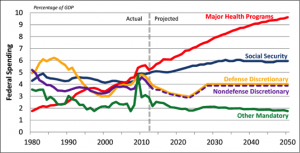As we have seen in one of our previous posts, the life expectancy is close to 100 countries across the world is now at an average of 80 years. Consequently, there has been an increase in healthcare costs required to maintain a healthy lifestyle.
If we look at the estimates of the health care costs of the OECD countries, the figures are quite alarming. Health care spending is projected to outrun the economy, GDP, wages and other key indicators in countries such as USA, France, UK and others. The per capita spending on healthcare is close to 18% of the percentage of GDP in the US, 11.6% in France, and 11.3% in Germany.
Through “Obamacare”, one of the most controversial healthcare reforms in recent times, USA has tried to significantly bring down the size of population that is not insured. But this has resulted in a huge increase in federal health expenditures. Currently, USA has one of the most expensive health care systems in the industrialized world and the spending has surpassed the budgetary spending on defence and social security.
SOURCE: Peter G. Peterson Foundation
The major factors that have led to a global increase in healthcare costs and expenditure are:
· Increasing proportion of older people – The widespread availability of healthcare services and facilities in the developed countries has increased the life expectancy numbers and in turn raised the spending
· Income Growth – As the economy continues to recover and the income levels rise, the public and private spending on healthcare will be accelerated in the developed and emerging economies
· Advancement in technology – There has been significant progress in the development and large scale use of medical technologies and as we all know technology doesn’t come cheap.
· Insurance premiums and payments – Insurance companies are a big player in the health care sector. In most of the cases, insurers receive a fixed percentage of the insurance claims i.e., profits. This provides an incentive to the insurance companies to raise the premium amounts and in turn the overall healthcare costs increase.
Along with the aforementioned reasons, we have to consider the impact of climate change on health care. We might feel that the global climate change is restricted to melting glaciers, longer and hotter summers. But climate change is gradually turning out to be one of the most dangerous threats to global health. Increased rates of respiratory and other chronic disorders, natural calamities, water and air borne diseases are some of the negative effects of climate change. If we consider the economics, the direct damage to health care costs is projected to be around US$ 4 billion by 2030. Another research finding concludes that the total health cost due to climate change events is around US$ 14 billion. These numbers and the growing threat of climate change can’t be taken lightly.
Source – NRDC- Health and Climate Change
Over the years, most of the employees in small and big firms have never fully understood the importance of insurance and its benefits. Lack of awareness of the benefits of insurance and financial education is the major culprit. As insurance coverage is provided by most of the public and private sector companies, there is reluctance on the part of the employees to understand and appreciate the importance of insurance planning and its benefits. Furthermore, people under-estimate the cost of post retirement insurance, which traditionally, is not covered by employers.
As mentioned earlier, insurance premiums have also increased a trend which is expected to continue. Employees have had to increase their contributions as more and more companies are looking at cost-cutting measures with respect to insurance coverage and health care benefits. In one research study, it was found that the percentage of all firms offering health benefits has come down to 57% in 2013 from 69% in 2010.
Source: Kaiser Foundation-Employer Health benefits
Adequate finances are needed to maintain a healthy lifestyle, especially in light of the ever increasing healthcare costs. These facts and figures emphasize the need for life insurance, health Insurance and Critical Illness cover, to ease the financial burden in the event of death or illness. Critical Illness and Life Assurance cover are crucial to a family.
At Gladstone Morgan, we work with various life insurance companies which offer a number of life insurance and investment-linked products. We understand the family’s need for financial protection in case of death or serious illness. The experts at Gladstone would help search for the right cover to suit your family’s particular needs. Do contact us in case you need assistance with insurance planning.
Disclaimer: All content provided on this page are for informational purposes only. Gladstone Morgan Limited makes no representations as to the accuracy or completeness of any information on this page or found by following any link on this page. Gladstone Morgan Limited will not be liable for any errors or omissions in this information nor for the availability of this information. Gladstone Morgan Limited will not be liable for any losses, injuries, or damages from the display or use of this information. This policy is subject to change at any time.
It should be noted the services available from Gladstone Morgan Limited will vary from country to country. Nothing in the comments above should be taken as offering investment advice or making an offer of any kind with regard to financial products or services. It is therefore important to reinforce that all comments above are designed to be general in nature and should not be relied upon for considering investment decisions without talking to licensed advisers in the country you reside or where your assets may located.Gladstone Morgan Ltd is not SFC authorized. Gladstone Morgan Ltd in Hong Kong is licensed with the Hong Kong Confederation of Insurance Brokers.